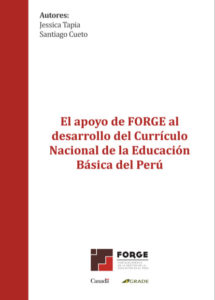El apoyo de FORGE al desarrollo del Currículo Nacional de Educación Básica del Perú
| Year | : | 2017 |
|---|---|---|
| Author/s | : | Jessica Tapia, Santiago Cueto |
| Area/s | : | Education and learning |
Tapia, J. & Cueto, S. (2017). El apoyo de FORGE al desarrollo del Currículo Nacional de Educación Básica del Perú. Lima: FORGE.
Various national normative documents and international experience underscore the importance of having documents that clearly indicate the learning expectations for students, based on which the various lines of educational policy must be articulated. Thus, according to the General Education Law, the National Curriculum is the basis of the National Pedagogical Policy, and the Ministry of Education (Minedu) is responsible for designing it. The National Curriculum also contains the learning that students must achieve at the end of their schooling; and its construction must be the result of a broad process of consultation with the educational community, with social and community organizations, with other agents of the State and with civil society.
The National Educational Project (PEN) proposes, in its strategic objective 2, the achievement – by students and educational institutions – of relevant and quality learning, hand in hand with the establishment of a shared, intercultural, national curricular framework, inclusive and inclusive, and that allows to institute regional curricula. This, so that each student develops as a person and can contribute to the human development of the country and social cohesion, overcoming exclusions and discrimination. The PEN also raises the need to define priority national learning standards and to evaluate them regularly, to ensure access to new and greater learning, measurable and internationally comparable (CNE 2006).
While it is important not only to safeguard the quality of the curriculum document, but also to ensure that measures are in place to support its implementation, the importance of the intentionally prescribed curriculum is underlined by the fact that it provides the necessary conditions for the provision of learning opportunities. The inclusion or exclusion of a specific content or performance affects the probability that certain potential learning experiences will or will not materialize. What is prescribed —and the way it is done— guides or hinders its implementation, as well as evaluation and learning (Valverde 1997). International experience indicates that the prescribed curriculum is configured as the instrument that should guide pedagogical practice, the development of materials, and performance evaluations.
Since 2010, and progressively, the ministerial administrations of successive governments introduced modifications to the National Curricular Design (DCN), 1 based on the identification of a series of difficulties. As it was developed in different political settings, this prolonged curricular construction —which lasted until 2016— configured different curricular scenarios and, consequently, diverse challenges. The FORGE project contributed to responding to several of these challenges, from a continuity perspective and by strengthening the capacities of the technical teams responsible for the sector.






